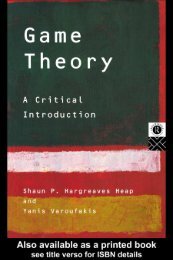handbook-executive-leadership-of-research-development-pdf-v10
handbook-executive-leadership-of-research-development-pdf-v10
handbook-executive-leadership-of-research-development-pdf-v10
Create successful ePaper yourself
Turn your PDF publications into a flip-book with our unique Google optimized e-Paper software.
BECOMING A SELECTIVELY RESEARCH-INTENSIVE UNIVERSITYQueensland University <strong>of</strong> TechnologyUnderlying the QUT <strong>research</strong> and innovation agenda for change was the consciousdecision to improve its <strong>research</strong> performance not just incrementally, but rapidly toa higher level as a ‘selectively <strong>research</strong>-intensive university’. The objective is widelyunderstood and clearly shapes the thinking <strong>of</strong> <strong>research</strong> leaders at all levels. It wasagreed that the University had to have a real sense <strong>of</strong> the direction it was taking witha strong guiding framework and an opportunistic and targeted approach. QUTdecided to make some immediate major changes beginning with a ‘reframing <strong>of</strong> its<strong>research</strong> activities as a contribution to creating new knowledge’.Senior <strong>executive</strong> identified 39 specific areas for attention and promoted the value<strong>of</strong> interdisciplinary <strong>research</strong>. The next task was getting alignment <strong>of</strong> all the elementsin place so that systemic obstacles did not undermine decisions about <strong>research</strong><strong>development</strong>. Targeting individuals and providing them with support was important,but so too was the need to gain the buy in <strong>of</strong> heads <strong>of</strong> schools, and also to recruitheads <strong>of</strong> schools from the kinds <strong>of</strong> institutions QUT aspired to be.The University has taken a cohort approach to recruitment, for example, advertising50 positions with a supporting structured induction program. This enabled a richnessto be exploited from putting these people together and adding value by opening upopportunities for multi-disciplinary approaches to <strong>research</strong>. Capacity building hasincluded maximising the <strong>research</strong> and <strong>research</strong> training capability <strong>of</strong> individual staff,and fostering early career <strong>research</strong>ers by linking their <strong>research</strong> <strong>development</strong> to facultyor University-wide <strong>research</strong> programs.The Early Career Academic Recruitment and Development (ECARD) Program is amajor element <strong>of</strong> the strategic approach <strong>of</strong> QUT’s <strong>research</strong> and innovation agenda.It is targeted at newly appointed academics with less than four years experience andprovides them with a range <strong>of</strong> opportunities to build their academic careers. It hasbecome a highly effective scheme to attract talented young academics to join QUTas well as retaining those already working at the University. The two-year programincludes the provision <strong>of</strong> start-up funds <strong>of</strong> $15,000 for each ECARD participant,$5,000 <strong>of</strong> which must be spent directly on <strong>research</strong> activities. The program providesadvice on grant writing skills in the context <strong>of</strong> QUT’s <strong>research</strong> and teaching priorities,support for <strong>research</strong>, teaching and community engagement, and assistance indeveloping networks and interdisciplinary collaborations with colleagues in otherparts <strong>of</strong> the University and beyond.Focus 4 — Developing a <strong>research</strong>-oriented workforce71



